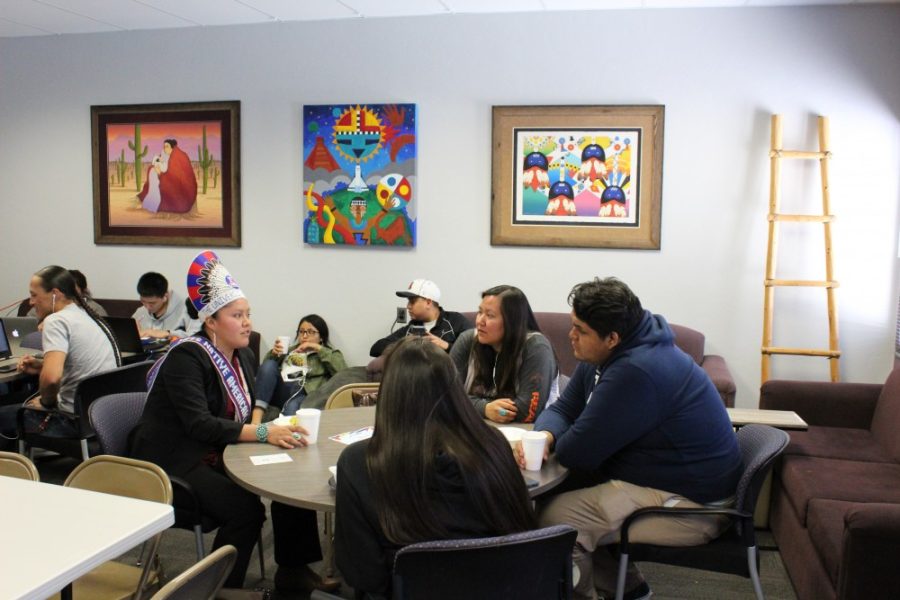Another week of school is almost complete at the University of Arizona, and Deshawna Sherlock, a Navajo freshman in pre-nursing, takes a much-needed break after class. She is having a good week since she found out that she will finally be receiving her Navajo Nation scholarship.
“It’s still getting dispersed, and I will not receive it until next week,” Sherlock said. The scholarship was delayed because of the federal government shutdown.
The shutdown may be over, but the political tsunami has impacted UA students from nearby Native American communities like the Navajo Nation. Some Navajo students still have not received scholarship money because of the shutdown.
According to a Jan. 10 press statement by the Office of Navajo Nation Scholarship and Financial Assistance, the shutdown closed the Bureau of Indian Affairs, including the BIA Navajo Region Office.
RELATED: Regents give go-ahead for the development of three new majors and two new master’s programs
Public Information Officer Carolyn Calvin, who works in the Navajo Nation’s scholarship office, said the shutdown stopped paperwork from being processed and left the scholarship office $2.5 million short.
“There was no one at the Bureau of Indian Affairs to accept the paperwork,” Calvin said.
The Navajo Nation did steer emergency money toward the scholarship office, according to its Facebook page.
Some students were left without means to pay their tuition, buy textbooks or pay living expenses. Students with parents who work for the federal government were also struggling to make ends meet.
Brennen Jones, a veterinary science student from Chinle, Ariz., and his family had a difficult time during the shutdown. Jones’ father works for the BIA on the Navajo Reservation and was furloughed. Jones’ mother works as a teacher, but her salary could not cover their monthly expenses. The family couldn’t make payments on their automobiles.
“I believe she recently took out a $3,000 loan to help cover the expenses,” Jones said.
Jones relied on his dad to give him money for food, so his extended family pitched in to help him out.
“Thankfully, I had relatives who were able to step in from Phoenix and are able to come down and buy me groceries,” Jones said. He was also able to use resources on campus like Native American Student Affairs in the Robert L. Nugent building.
Rachelle Simpson, interim director of NASA, said she noticed an influx of Native American students, especially from the Navajo Nation, needing assistance or guidance since funding has been delayed due to the shutdown.
“We do our best to advocate with and for the student for temporary loans, zero-interest loans that are directly offered through the office of student financial aid,” Simpson said. She said bringing in documentation like an award letter or a financial aid check would help make the process easier.
Nicholas Wilson, a graduate assistant at NASA, said students can come into the office when they need help with talking to financial aid or a tribal scholarship office.
RELATED: Survivor Advocacy to hold open house to increase awareness
“We try to connect with financial aid and do what we can to advocate on their behalf,” Wilson said. Despite the temporary slowdown in Washington, Wilson points out that overall national politics can influence Native American college students.
“Any time there’s any kind of issue between our communities with the federal government, it always impacts our students in some way or another. Either it’s through scholarship or it’s other things that they need in order to be here to focus on school,” Wilson said.
Sherlock said she is happy her financial aid from the Navajo Nation will come through for her, but her family on the reservation is still reeling from the effects.
In her hometown of Shonto, Ariz., her relatives were laid off from the National Park Service and were forced to borrow money. Now that the shutdown was lifted, they have to pay back those debts. With another federal shutdown potentially coming on Feb. 15, they may be in same position as before.
Sherlock said she tries to concentrate on her pre-nursing studies and remains hopeful about her future. She said her primary goal after nursing school is to “go back to my community and help them.” For now, she can take a short break from class and wait.
Tyson Hudson is a graduate student in the UA School of Journalism.









